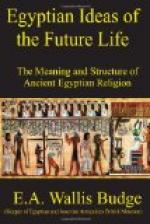But although such exalted ideas of Osiris and his position among the gods obtained generally in Egypt during the XVIIIth dynasty (about B.C. 1600) there is evidence that some believed that in spite of every precaution the body might decay, and that it was necessary to make a special appeal unto Osiris if this dire result was to be avoided. The following remarkable prayer was first found inscribed upon a linen swathing which had enveloped the mummy of Thothmes III., but since that time the text, written in hieroglyphics, has been found inscribed upon the Papyrus of Nu, [Footnote: Brit. Mus., No. 10,477, sheet 18. I have published the text in my Chapters of Coming Forth by Day, pp. 398-402.] and it is, of course, to be found also in the late papyrus preserved at Turin, which the late Dr. Lepsius published so far back as 1842. This text, which is now generally known as Chapter CLIV of the Book of the Dead, is entitled “The Chapter of not letting the body perish.” The text begins:—
“Homage to thee, O my divine father Osiris! I have come to thee that thou mayest embalm, yea embalm these my members, for I would not perish and come to an end, [but would be] even like unto my divine father Khepera, the divine type of him that never saw corruption. Come, then, and make me to have the mastery over my breath, O thou lord of the winds, who dost magnify those divine beings who are like unto thyself. Stablish thou me, then, and strengthen me, O lord of the funeral chest. Grant thou that I may enter into the land of everlastingness, even as it was granted unto thee, and unto thy father Temu, O thou whose body did not see corruption, and who thyself never sawest corruption. I have never wrought that which thou hatest, nay, I have uttered acclamations with those who have loved thy KA. Let not my body turn into worms, but deliver me [from them] even as thou didst deliver thyself. I beseech thee, let me not fall into rottenness as thou dost let every god, and every goddess, and every animal, and every reptile to see corruption when the soul hath gone forth from them after their death. For when the soul departeth, a man seeth corruption, and the bones of his body rot and become wholly loathsomeness, the members decay piecemeal, the bones crumble into an inert mass, the flesh turneth into foetid liquid,




